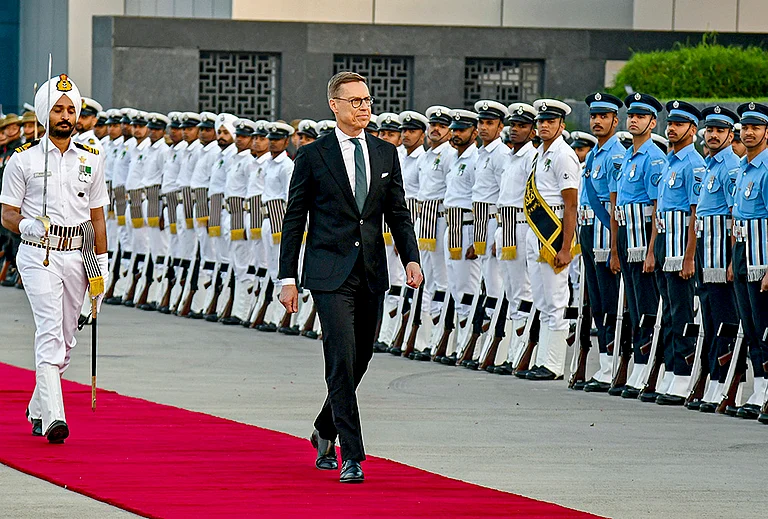There are few words that can adequately capture the timeliness and sheer brilliance of this overview of the history and present of Hindu nationalism in India. Tanika Sarkar, one might say, an ‘intimate enemy’ of the phenomenon best known as Hindutva or Hinduness, has produced a volume that is essential reading for anybody concerned with the rise and seeming dominance of Hindutva in India.
To her tremendous merit, however, despite having observed this historical process at close quarters over several decades, Sarkar does not seek to denounce and vilify. Rather, her declared intentions are to understand the great appeal Hindu nationalism has steadily come to hold over the course of its jagged career, an act of great restraint and moral patience, on her part as an intellectual and historian. The reader emerges from this study deeply informed about the slow and incremental processes whereby we have arrived at where we are at present. To draw out the deep implications of the study: Hindu nationalism is un-truth, and deeply and ironically, irreligious. It’s haughty claims to supremacy have been hoisted by virtue of falsehood.
Eschewing a strictly chronological development, the chapters in this book are primarily versions of previously published essays that delightfully meander through the course of Hindu nationalism’s checkered history. As Sarkar informs her readers, they emerged from the immediacy of political urgency, yet contrary to her own assertion, hardly have compromised on their scholarly rigour. In a central sense, the core contribution of Hindu Nationalism in India is to plumb the ideological depths of the violence of Hindutva. To quote Sarkar at some length regarding her framing questions: “How have very large swathes of our people come to accept, endorse, and engage in such acts? What produces the will to violence and violation, how has a common sense been achieved that normalises them? How has democracy come to be so widely translated as majoritarianism?” Careful readers of these questions will appreciate their profoundly political significance, as well as the global reach of their salience. She is grappling here with some of the most pressing political-theoretical concerns of our times.
Sarkar explores these queries through a vast range of historical, social, cultural, and intellectual contexts spanning a little over a century of our modern past. Composed of eight chapters, she deploys a resolutely feminist analytical lens —only appropriate for the foremost feminist historian of our times— hence recurring themes include women’s participation in the Hindu nationalist movement, the gender-construction of Hindutva itself, affection, historicity, and perhaps, above all, the gendered ideology of that nationalist formation. This marks an important intervention in the slowly growing literature on Hindu nationalism, for indeed, as Sarkar herself has taught us in previous works, it is on and through the woman’s body and subjectivity that nationalist programmes have been inscribed. The absolutely necessity of a feminist interpretation of Hindutva is driven home with emphasis — especially due to the traditional emphasis on the masculinism, if I may be permitted to coin a term, of Hindu nationalism in both scholarship and practice.
The chapters composing the study include evaluations of Bankim Chandra Chattopadhyay’s seminal series that would be compiled into the novel Anandamath; women’s subjectivity; women’s organisations; love; education; social power; history, and a concluding chapter on nationalism and history. Each of them addresses different aspects of her guiding questions.
Sarkar militates against the notion, prevalent in centrist and liberal circles, that Hindu nationalism is somehow an aberration from the authentically secular origins and development of India’s nationhood. Rather, she demonstrates, with painstaking care and attention to detail, the degree to which Hindu rightist organisations and formations have been successful at gradually, stealthily, but certainly, penetrating into the social, cultural, and political lives of ordinary Indian citizens, and women, in particular.
Of the many nodes of the gargantuan apparatus better known as the Sangh Parivaar, Sarkar identifies the crucial role the Rashtriya Swayamsevak Sangh (RSS) has played in this silent infiltration and diffusion of the Hindu self. Yet, this is not merely a top-down process. There is an essential dialectic between that organisation and the people of the country; political communication, after all, must be imbibed and affirmed for growth and blossoming, and prior to the hurly-burly of electioneering and political dividends. It is at the interface of ideology and Hindu moral economy, then, that Sarkar locates Hindu nationalism’s striking and gradually unfolding successes.
To my mind, arguably the most significant proposition the book invites us to consider is the mangling of truth on which Hindu nationalism has been erected. While each of the chapters of the study illustrates this butchery, it is indeed the subtle red thread that runs through the work. To illustrate, consider her opening chapter on Anandamath, that was seized with great gusto by Hindu nationalists of the early 20th century, when it began to coagulate as a distinctive ideological and practical program. Sarkar shows us how all the many complexities, contradictions, and silences in that landmark text —that she skilfully displays— were systemically ironed over in the service of a monochrome, gendered, exclusivist, and might one add, banal imagination of Hindu nationhood, captured in the rallying slogan, Bande Mataram. As Hannah Arendt taught us through her brilliant analysis of the Nazi Adolf Eichmann’s psychopathologies, evil is in the final analysis, banal and idiotic.
The writer of this review was recently asked in private correspondence whether the Republic of India is undergoing a transformation from authoritarianism to totalitarianism. At the time of writing, the civil liberties of Indian citizens continue to be eroded apace. Fascism, for that is what we should call it, is here. Totalitarianism shares a close kinship. Sarkar has served the resistance for the entirety of her professional life. Her book should be read widely, both within and without India, so all lovers of freedom may understand how and why Hindu nationalism and the people of India are locked in this perverse embrace. And while she rightly reserves judgment about Hindu nationalism, readers of this book will find much to drive them to an unavoidable conclusion: it is time for Hindutva to be overcome.
(Dwaipayan Sen is a historian. He is the author of 'The Decline of the Caste Question: Jogendranath Mandal and the Defeat of Dalit Politics in Bengal' and several articles and essays concerning caste, community, and more recently, colonial capitalism. Views expressed are personal to the author.)


















